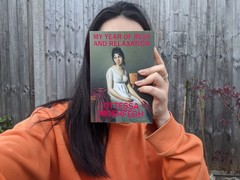We're discussing a new chapter each week. Read along with us and submit your thoughts to coronabookclub@vice.com.
a) The narrator’s financial advisor tells her to sell her parents’ house in this chapter. How does this make her feel?
Hannah Ewens: The narrator’s heart is really starting to crack open now – and I’m here for it! When she gets the call, the tone completely shifts: “But when I closed my eyes and pictured the house in that moment, it wasn’t empty.” It wasn’t empty because the narrator used to feel – however unhappy or otherwise – in that house, when her parents were alive. One sentence really moved me: “How many of my parents’ hairs and eyelashes and skin cells and fingernail clippings had survived between the floorboards since the professor moved in?” It’s exactly the sort of practical, painful and almost grotesque thing that you do think when someone close to you has died. It’s a sign that the narrator is still alive – and soon to wake up.Lauren O’Neill: The narrator imagines the house very clearly at this moment – perhaps more vividly than it ever really was. When she notes the colour of her parents possessions – “[my father’s] huge grey computer blinking neon green, a stack of papers he’d marked in red” – it makes me think of how hindsight can cause us to remember things as better than they actually were at the time. The narrator herself realises this: “The nostalgia didn’t hit,” she says. “These weren’t my memories.”b) Flowers arrive at the narrator’s apartment and for a split second, she believes they are from Trevor. “Was this the beginning of a new life?” she asks. Is the life she wants?
Eleri Riglar (via email): Having previously referred to Trevor as the trash blocking her from cleansing her psyche, it seems that the narrator does mostly see him as a negative element in her life. The transactional and frankly quite gross way he behaved when he came over in the previous chapter probably once again shattered any “delusion” the narrator retained about him. I don’t think that this would be the life she would want.Her on-off relationship with Trevor is also conducted in the style of an affair (mostly hanging out in dingy hotel bars… was he seeing someone else the whole time?) so admittedly, she can’t have much insight into what a new life with him would be like. When she sees the flowers and wonders if they are from Trevor, she describes herself as a “frozen corpse” – doesn’t exactly sound like somebody facing the possibility of their dream life!LO: I think the narrator continues to pursue Trevor because his presence gave her life shape – in the same way that school, university and her parents also did. Being with Trevor gave her something to do, and a way of being (in the previous chapter, the narrator talks about liking sterile hotel bars over going to clubs because Trevor prefers it, for example), but now all that’s left is Reva crashing into her apartment unannounced, and lots and lots of sleep. So, Trevor’s return might give her an easy way out – a way of procuring the new start she wants, but without having to embark on her own transformation.The action in chapter six places the narrator on the brink of a number of things. It could be a new life with Trevor, or a life without meds after she realises that Reva has taken her pills. No ground is solid until she reaches the conclusion, which is itself another edge (literally!): “When the solution to my problems came to me, it landed in my mind like a hawk on a cliff.”c) The narrator watches George W. Bush’s 2001 inauguration on TV, and later notes that the "Senate has confirmed Mitch Daniels as director of the White House Office of Management and Budget for the newly minted Bush administration. Fifty-one-year-old Daniels has been a senior vice president for Eli Lilly and Company, the Indianapolis based pharmaceutical giant.” Why does Moshfegh include this detail?
Eleri: This detail gives some macro commentary on the health and pharmaceutical industry in the US. Seeing someone from one of the larger pharmaceutical companies ascending to such high political office shows how the consumerisation and widespread misuse of pharmaceutical drugs in the US is condoned or even encouraged by legislation, as well as the revolving door between big business and government.HE: Big pharma is dealt with throughout the book in the form of Dr. Tuttle and her never-ending prescription pad, and the narrator with her dependency on the drugs. This newsflash is such a great blink-and-you’ll-miss-it-as-scene-description moment to link together politics and the pharmaceutical industry in the reader’s mind. The insidiousness of the connection in real life is so grim and relentless – big pharma is politics in the US (and worldwide). Of course a man who manages budget is also on the board for a “pharmaceutical giant”.d) How does the tone change when the narrator realises she doesn't have her pills?
LO: It gets a lot more frantic. As soon as the narrator realises that the pills are gone, the sentences become shorter: “I had no doubt.” “My face in the mirror startled me.” “I did look different.” It gives the same feel as quick editing on a TV show, which is often used to create a sense of disorientation. Here, the narrator moves from one idea to another very quickly, which we’re not really used to with her, as we’ve got to know her as someone whose thoughts unfold languidly.Her frantic-ness is also reflected in the message she leaves for Reva, where she tries to guilt trip her. Again, it’s fairly unusual for the narrator: we’ve never seen her this shaken, and her approach to Reva is usually disdainful and lazy, rather than all-guns-blazing. We’ve mentioned before that the narrator frames her medication as a way of conceptualising her escape into a new future where she has dealt with her trauma, and this is what happens when the idea of that is removed from her grasp, even temporarily.Eleri: Even before Reva takes all of her pills away, the narrator is becoming disillusioned with them, due to her near inability to sleep in the previous chapter. She says, "I knew in my heart they were all useless now… a gun with no bullets". The quite scary out-of-body experience and racing heart also suggest that the side effects of such a heady cocktail of drugs is finally catching up with her.But when the narrator discovers that the pills have gone, the mood changes completely. There’s a brief period of disbelief but then she lashes out at Reva, speaking aloud the kind of vitriol towards her that so far she has only expressed in her head. The rage here is almost animalistic. Without her drugs, the bottom has fallen out of her world. She looks in the mirror and sees herself as “red and wet with sweat.” I think this is the first time in the novel so far when she has not looked at her reflection and shrugged it off as “still pretty”. In taking her drugs, Reva has managed to penetrate the mask of indifference that the narrator mostly wears.HE: She becomes snappy, meaner, even more irritable. Hilariously, she’s suddenly galvanised enough by her desire for her usual pharmaceutical crutches that she leaves her building for the first time in ages. This brings us finally out of the narrator’s apartment to Reva’s place. I hadn’t realised how claustrophobic I was feeling as a reader inside the narrator’s place – or under her drug-induced lethargy.e) We finally get inside Reva’s apartment in this chapter. What is it like?
LO: Reva’s apartment makes me feel very sad. She lives alone and her home is full of food (a mixture of diet-friendly foods, and food for bingeing), clothes and exercise equipment. It’s unfortunately everything you’d expect from the narrator’s portrayal of her, and flicks into sharper focus all of the things that Reva is a victim to – specifically ideals of femininity and beauty.HE: The narrator has commented plenty of times on Reva’s bulimia, but this apartment is like a horror story set, that shows the full story of how the illness has completely ravaged Reva’s life. The extended great reveal as the narrator walks around her apartment, looking at all the food and dirty dishes, reminded me of how shocking it was when you see all the rotting chicken carcasses under Daisy’s bed in Girl, Interrupted. Had the narrator been more of a friend to Reva or even been able to leave her apartment to visit Reva, she’d have truly understood how severely mentally unwell she was. We, the reader, are discovering Reva’s apartment along with the narrator, who has no sympathy for her. In fact, in her withdrawal state, the narrator shockingly says she’s never hated Reva more. I suspect that Reva is so much more sympathetic and relatable than the narrator has made out.PROMPTS FOR WEEK SEVEN
(This is the final week! Read chapters seven and eight)
a) As the narrator is about to embark on her four month-long sleep, she invokes the language of ritual, almost religiously. “Something had to be burned and sacrificed. And then the fire would burn out and die.” Why does she talk about what she is about to do in this way?
b) Ping Xi wants the narrator to burn her identity documents on camera. In response, she says “I was born into privilege, I’m not going to squander that […] I’m not a moron.” What’s your take on how the novel deals with and presents the privilege of its narrator?
c) How does the tone change when the narrator has woken up? Has she changed?
d) The narrator enlists Ping Xi to help her on her mission to sleep, and art is referenced a number of times in the chapter once she is awake. What does art mean to the narrator?
e) The final chapter is about the event we knew was coming: September 11th 2001. What feeling does the end of the novel leave you with?
@hannahrosewens / @hiyalaurenSign up to our newsletter to get the best of VICE UK delivered to your inbox every week.

